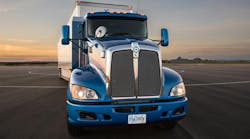Toyota envisions a world where semis hauling cargo from port to port will not only move quietly but without producing emissions.
In order to achieve this Toyota Motor North America, Inc. (TMNA) announced on April 19 its “Project Portal” - a hydrogen fuel cell system designed for heavy duty truck use at the Port of Los Angeles.
The zero-emission truck proof of concept will take part in a feasibility study examining the potential of fuel cell technology in heavy duty applications. The testing will begin with short-distance fleets that will travel between the city’s docks and nearby warehouses.
“Toyota believes that hydrogen fuel cell technology has tremendous potential to become the powertrain of the future,” said TMNA executive vice president Bob Carter. The fuel-cell truck will emit nothing but vapor.
The Project Portal platform is designed to provide the target performance required to support port drayage operations. The truck generates more than 670 horsepower and 1325 pound feet of torque from two Mirai fuel cell stacks and a 12kWh battery, a relatively small battery to support class 8 load operations. The concept’s gross combined weight capacity is 80,000 lbs., and its estimated driving range is more than 200 miles per fill, under normal drayage operation.
The study will begin this summer and become a part of the Port’s Clean Air Action Plan, which has dramatically reduced harmful emissions from operations at the Ports of Long Beach and Los Angeles since 2005. These ports, along with Oakland handle 40% of U.S. container traffic, with commercial shipments generating half of California’s toxic diesel-soot emissions and 45% of the nitrogen oxide that plagues L.A. with the nation’s worst smog, as reported by Bloomberg.
“The port is unable to grow at all until it can show there are no incremental emissions coming from trucks or ships or whatever,” Craig Scott, Toyota’s U.S. manager for advanced technologies, said in an interview reported by Bloomberg. “That is a big task. And we don’t think there’s another heavy-duty vehicle on the market -- with zero-emission and technology and the same performance as a diesel -- that isn’t a fuel cell.”



